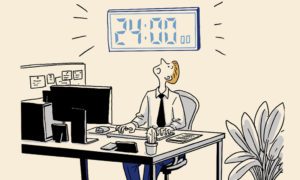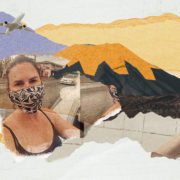Why Should We Plan and Invest if Life’s so Short
May 19, 1780, is known as New England’s “Dark Day”. New England, a region in the United States, experienced strange weather that turned the sky dark as light from the sun was obscured. Work had to stop, and people had to light candles in the middle of the day. Citizens were advised to return to their homes to prepare for the end of the world.
Amidst the chaos, panic and confusion, legislator Abraham Davenport expressed his disagreement to “hunker down” when it was suggested that the meeting he was in be adjourned. He said: “The day of judgment is either approaching, or it is not. If it is not, there is no cause for an adjournment; if it is, I choose to be found doing my duty. I wish therefore that candles may be brought.”
I think Davenport made a great point that we can learn from today. Each day, we get closer to the Lord’s second coming. The earth is experiencing an increasing amount—and intensity—of the “birthing pains” Jesus described in Matthew 24:6-8: “You’ll hear rumours of wars . . . nations will rise against nations, kingdoms against kingdoms. There will be famines and earthquakes in various places.”
I live on the Pacific Island of Tonga, and over a year ago, we had the Hunga-Tonga Hunga-Ha’apai eruption. Now, another volcano, Tofua, is showing increased activity—there’s smoke, booming sounds, even lightning—and it could blow anytime. With the frequent earthquakes we get, the threat of a tsunami is very real.
So, what do we do? Do we plan for tomorrow or just live for today? Do we live in expectant hope or in a constant state of fear and caution?
Life goes on—so we do our best to settle down
Here in Tonga, we all live with a hyper-sensitivity to sirens and earthquakes. And yet life goes on, and it is “business as usual” for the most part. Each day, I still have wonderful students to teach and things to do.
Reflecting on this reminds me of the letter the prophet Jeremiah wrote to God’s people when they were conquered and taken forcibly to live in Babylon. It is in this letter that we find the famous verse: “For I know the plans I have for you . . .” (Jeremiah 29:11). Jeremiah went on to say that God will rescue them and bring them back to Israel after seventy years. However, what were they to do in the meantime?
Knowing that the Israelites may be tempted to not invest in anything and just wait for the rescue, God inspired Jeremiah to tell them to “build homes, and plan to stay. Plant gardens, eat the food they produce. Marry and have children” (Jeremiah 29:5-7, NLT). While they have been promised rescue and redemption, they are told to still live as if they will be staying there for good!
Like the Israelites, we have the promise of our King returning to bring us into the fullness of His kingdom. Unlike them, however, we do not know when this will happen. Then there are other parts of Scriptures that tell us to live as foreigners in this world (1 Peter 1:17, 2:11).
This idea of living on earth as one just “passing through” may seem like a contradiction to what Jeremiah had written, but together they’re meant to give us more understanding. I think of it this way—with foreign ambassadors, their citizenship lies with the country they call home, yet they are sent to live elsewhere for a fixed term to serve and invest in the country to which they’re assigned. So, they bring their families, raise their children, and get involved in community events and activities.
In the same way, we are ambassadors of heaven (2 Corinthians 5:20, Philippians 3:20) who have been given an assignment. As believers, our citizenship is in heaven, yet we are called to live out our lives on earth faithfully (2 Corinthians 5:9), to serve, invest in people, and make Jesus known.
Jeremiah 29:7 goes on to say, “Work for the peace and prosperity of the city where I sent you into exile. Pray to the Lord for it, for its welfare will determine your welfare.” This goes above and beyond just making plans for ourselves while living on earth. We are to seek the welfare of the world we live in, too! Praying genuinely for our government leaders, different spheres of society and our communities is part of seeking the welfare of the world. In action, it could look like making wise choices to care for the environment, donating food or clothes to organisations that you know take care of people in need. It could look like using your gifts and talents at your place of work, study or leisure activity to serve those around you.
I do not know how long I will be in Tonga. Maybe a few more years, or perhaps it will be my forever home. Either way, I choose to invest in this land. I teach at a local school and have made good friends. I have invested time, money, love, and passion into school-building projects, developing curriculum, and leading Bible study groups to disciple other young women.
God has placed me here this season and I want to leave a legacy, to deposit something that will outlive my time here.
Learning to invest with open hands
While it can be hard to invest in something that may be temporal, the key, I have discovered, is to hold everything with open hands, as an offering to God. I acknowledge that God has called me here, and He expects me to faithfully steward whatever He’s given me.
So yes, I plan and invest, but at the end of the day, I come to God in humility and confess that this is not my work, but His. James 4:14-16 puts it well: “How do you know what your life will be like tomorrow?… You ought to say, ‘If the Lord wants us to, we will live and do this or that.'” Making plans and yielding them to God is what James is saying here.
I was engaged to a man I had prayed for and really thought would be “the one”. As it happens, we never made it down the aisle. I have had to grieve and ask God many “why” questions, but I encourage myself that if I love Him and I’m called according to His purpose, He will work even this out for my good (Romans 8:28). Through this ordeal, I’ve had to face fears and deal with heart issues, and these have led me to grow more intimate with God.
Plans may fold, and things may not work out, but our character, the things we have learned, the gifts and talents we have developed, the relationships we’ve invested in—in and through all our earthly experiences, God is refining our character and moulding us.
We, who are in Christ, have already begun our eternal journey (John 5:24), and because eternity has begun, all the character refining we have gone through counts.
Like Abraham Davenport, I want to be found doing my duty and living my life to the fullest, as God intended. We do not know the hour Jesus will return, yet we are encouraged to do everything for the Lord, to work hard (Colossians 3:17,23-24; Proverbs 6:6-8; Proverbs 12:11; Ecclesiastes 9:10; 1 Corinthians 10:31; 1 Thessalonians 4:11-12) and to leave a legacy for the next generation (Proverbs 13:22; Psalm 112:1-3).













Leave a Reply
Want to join the discussion?Feel free to contribute!